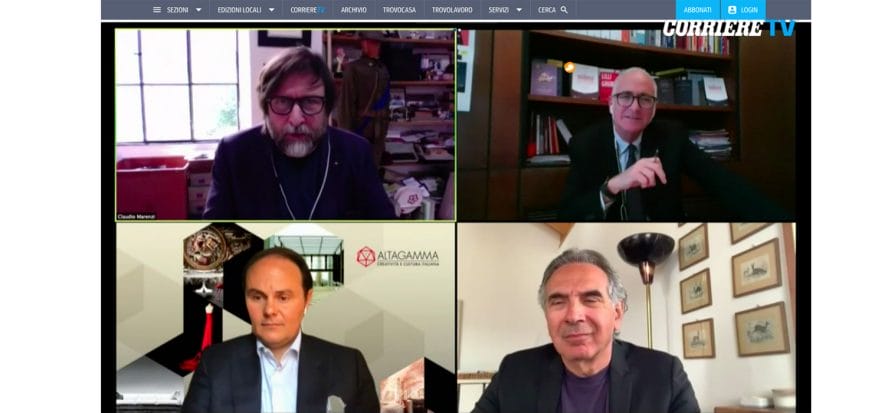Trade unions agree on the end of lockdown. Confindustria Moda have recently signed a protocol with Femca-Cisl, Filctem-Cgil and Uiltec-Uil to allow fashion companies to reopen. In compliance with safety standards of course, since “security is paramount – commented Claudio Marenzi, president of the entrepreneurial association and chief owner of Herno brand, while talking to corriere.it –. Together with the representatives of workers’ interests, we have set a joint protocol we are going to submit before MISE and scientific committees. During our talks with social parties we realized that reopening is absolutely of paramount importance”. In other words, they want lockdown, formerly imposed because of the Coronavirus pandemic, to finish as soon as possible. Otherwise, haute couture brands might relocate elsewhere, therefore taking the value chain to other countries.
Trade unions agree
Should fashion companies extend their shutdown beyond April 20th, pointed out Marenzi, industries would be in danger of collapsing. “We are the only ones in the world who have, in house, the whole textile-clothing-accessory industry chain, which is top quality as well – he remarked –. In Italy we are still in lockdown; in contrast, in other European countries, which are pretty much dealing with the same situation, they are working again. We are talking about France, Spain, Portugal and Turkey as well”. This is the obvious question then: while due dates are impending, how long can international brands still wait for firm decisions, which are up to Italy’s government, before they eventually make up their mind? “Some brands might decide to switch from our industry to another one – such is the scenario depicted by the President of Confindustria Moda –. That would be tragic, especially to small enterprises. Brands will manage to recover from this crisis. Yet, if our companies do not reopen right now, fashion might start again without Italian industry”.
20th April, a fateful date
“Our manufacturing industry is a seasonal one: we have to deal with relevant dates we cannot postpone”. Carlo Capasa participated in the corriere.it panel as well. The president of the Camera Nazionale della Moda Italiana (the National Chamber of Italian Fashion) illustrated how urgent the agenda is: “We must have the possibility to present our sneak preview collections in June, in order to sell them in January, online as well. Besides that, we have to deliver our selections to boutiques all over the world. In China Hermès have successfully reopened their stores. If we do not reopen right now, the whole year will go up in smoke”. Things are like that, acknowledged Capasa: not only the readers of a general newspaper, who therefore consist of non-professionals involved in the business, require such information. In fact, politicians headquartered in Rome need a fully detailed explanation as well: “I hear about several committees and technical managers engaged by Italian government – continued Capasa –. There are no fashion experts among them though. We are submitting documents and we are compelled to grant interviews to explain how the industry works”.
Besides reopening
We need to set reopening in motion, then, and secure the manufacturing industry. “Some months ago, we used to talk about reshoring – carried on Marenzi –, an opportunity to bring back in Italy new segment commissions and orders: in fact, high quality already belongs to us. In a few months things could be different though”. First, we must get out of lockdown quickly. Yet, that is not enough: in order to draw work opportunities, “we must take immediate action and modify our tax wedge alongside energy-related costs, which are 30% higher, on average, compared to other countries. Otherwise, recovery will not be doable – pointed out the President of Confindustria Moda –. We are not competing with Bangladesh and China, but with Portugal, Germany and Romania, which are European countries. What about salary cages? Someone would flip out about them: although we may be sceptical about such solution, they would foster employment a great deal, especially in Southern Italy”. Not to mention the credit issue: “Small and very small enterprises need non-repayable loans – commented Capasa –. Family-run businesses, whose profit margin rests on wages, cannot pull it off with a normal loan”.
Reopening is feasible, as long as it is safe
“In my factory, 30 workers have been sewing, pro bono, white coats and small masks for four weeks – wrapped up Marenzi –. We are running at half speed, in compliance with mandatory precaution measures. Therefore, it is doable. If we are bound to live with this virus for a long while, then we have to find a way to reopen quickly: otherwise, an economic pandemic will come after the health one”. “We must safeguard the made in Italy manufacturing industries – recapped Matteo Lunelli (Altagamma foundation) –. Our companies rest on a system composed of small and very small enterprises: they are the weakest ones. If we do not set in motion again the made in Italy business, our industries will be in danger of collapsing. In fact, factories that reopened to produce small surgical masks and white coats proved their ability to handle the situation properly”.
Read also:










